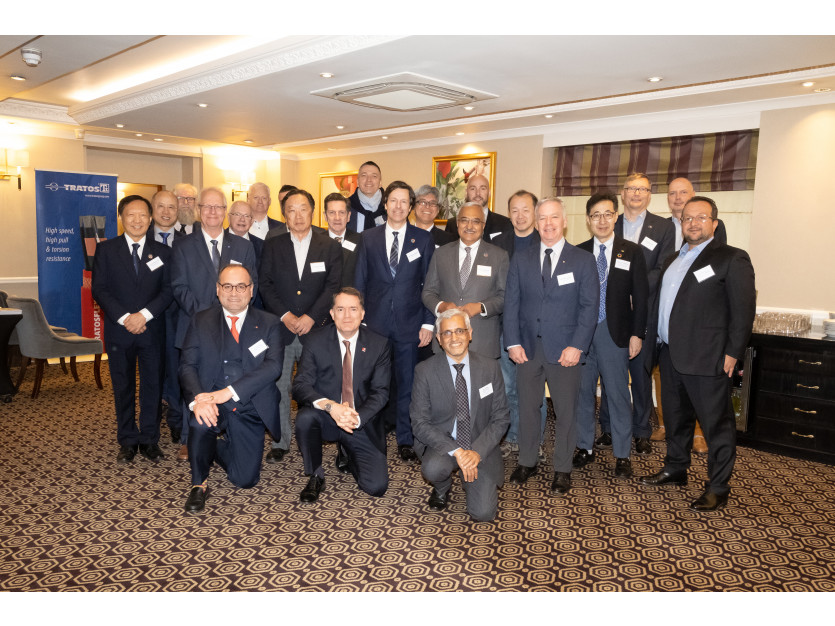Made in Britain member, Tratos hosted an international panel of experts at the 2023, IEC MSB General Meeting. Mr John Pearce, CEO of Made in Britain, contributed as one of five keynote speakers at the 2023 General Meeting of Market Strategy Board (MSB) of the International Electrotechnical Commission (IEC) in London, on 18th April 2023 at the invite of host, Dr Maurizio Bragagni OBE, CEO of Tratos Ltd, long-standing member of Made in Britain.
Headquartered in Geneva, Switzerland, the IEC prepares and publishes international standards for all electrical, electronic and related technologies and is a neutral, independent international forum where globally renowned experts from industry, government, academia and user groups can work to find consensus on solutions to the broad technical challenges of the sector.
In the frame of this meeting, Tratos hosted a round table on “Using innovation and standardisation toward the decarbonisation of the transport sector”. Mr Pearce was joined by experts from representing the UK government’s Department for Business and Trade, BCA, RIA, PEMA, Cavotec and other key players in the cable, rail port, manufacturing, and utility sectors with a stimulating presentation on the digitalisation of the physical reality from by Prof Gianvito Lanzolla, Professor of Strategy, Bayes Business School, Faculty of Management. Tratos offered participants a 3D virtual tour of its manufacturing site in the UK and its products and an overview of what the company is doing to achieve sustainable development and net zero emissions targets.
Below transcript of the Mr Pearce’s speech:
PROXIMITY of products and produce to the people that need them is one of the key metrics of comparison, if we are to address the environmental, social and economic challenges we face, exponentially and together.
Knowing where materials are found, how far they travel to be transformed into goods and, crucially, how much energy was spent to make and then move them, enables us to accurately compare metrics of emissions, circularity, resource scarcity and risk.
At Made in Britain, we are uniquely structured to capture real-time data on 2000 manufacturing businesses, to understand the many benefits of buying British or procuring goods made much closer to where they are needed. I will attempt to convince the panel that transparency and regulation within trade associations can help socialise vital knowledge to further decarbonise our sector and show other sectors how we do it.
Made in Britain is a trade and promotion organisation, just 8 years young and growing at anything from 10-20% every year. 10-20 new members every month.
Our work is to protect the official licenced Mark and serve the growing list of businesses that wish to use it. The Mark identifies both the products the business makes and the fact of their membership in their organisation. We have roughly 2000 members – 90% are SME manufacturers (up to £30m) and about half are making a trade or industrial product. The remainder make goods you can buy in a department store - retail makers.
To qualify for membership, businesses have to share a lot of information about themselves, once per year into our database, and once a month or so into our News platform. We know a lot about our manufacturing members – including what materials they use, where they sell their goods, how many people they employ and what their successful (business) actions are.
The Made in Britain news feed is only good news. We regulate it. And we’re member owned as a non-profit and the board of directors keep us 100% self-sustaining and focused on membership service – helping manufacturers succeed together.
My argument today around decarbonisation is a simple one. It is built on four pillars of wisdom that Made in Britain is happy to share with anyone who asks us – including local, regional, national, or international governments and policy makers working with them.
Firstly, regulated open news feeds for a business community is a great way of knowing who is doing what right now. We use the habit of self-promotion that people have gained through 15 years of social media to allow our members to project positively about their achievements to their peers.
Secondly, transparency relationships like those of member with trade representation bodies benefit everyone and the planet. We forge a member-to-member trust relationship so that our members can find each other to buy and sell and learn.
Thirdly, to reduce emissions overall, we can start with the easy win. Find a supplier that is nearer to you. Our next phase of mapping our members will be to publish a Proximity map of the whole of UK – so any of our members can find a new supplier, or buyer, and compare the relative proximity and increase the probability of a much lower carbon footprint if the supplier being replaced is in another country or on another continent.
And finally, focus on the assumption that people working in business, especially manufacturing, are aiming at the very highest possible outcomes. It is us that have created this pollution mess and we can definitely undo some or all of the damage we’ve done to the commons (water, air, sea, soil) and I honestly believe the appetite to clean up first and move to a fully regenerative, cleaner economy is very high.
As someone who carries a profound faith in human nature, I do believe that the public narrative of decarbonisation, restoration of the natural world and shift to a cleaner, fairer economy is coming, and that in business we have a duty to lead and support that narrative with our actions and words.
Image source: Courtesy of Tratos
By Made in Britain 2 years ago | By Made in Britain


